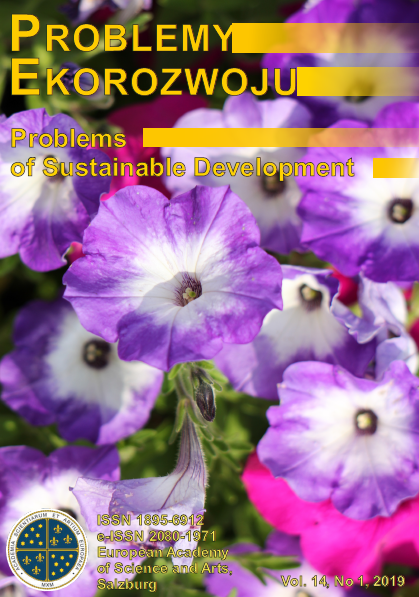ACEVEDO B., JOHNSON S., 2013, Chapter 8: Sustainability in practice – Action learning and the green impact initiative, eds. Atfield R., Kemp P., Higher Education Academy, UK, https://www.hracacademy.ac.uk/sites/default/files/ESD_Acevedo_final_0.pdf (1.06.2018).
ACUPCC: American College and University President’s Climatic Commitment, 2014, Higher Education’s role in adapting to a changing climate, http://www.presidentsclimatecommitment.org/files/documents/higher-ed-adaptation.pdf (1.06.2018).
ARVIDSSON R., HILDENBRAND J., BAUMANN H., ISLAM K.M.N., PARSMO R., 2016, A method for human health impact assessment in social LCA: lessons from three case studies, in: International Journal of Life Cycle Assessment, 23, p. 690-699.
BAUMANN H., TILLMAN A.-M, 2004, The Hitch Hiker’s Guide to LCA. Studentlitteratur AB, Lund, Sweden.
BAUMANN H., 2017, Personal e-mail communication on 6th and 11th October, Chalmers University, Gothenburg, Sweden.
BERGSDAL H., 2017, Personal e-mail communication on the 6th of October, AsplanViak, Trondheim, Norway.
BIGGS J, TANG C., 2011, Teaching for Quality Learning at University, Open University Press, McGraw Hill Education, England.
CAPRA F., Luisi P.L., 2014, The Systems View of Life – A Unifying Vision, Cambridge University Press, Cambridge, United Kingdom.
DOBSON H., TOMKINSON B., 2013, Chapter 3: Practical education for sustainable development through interdisciplinary problem-based learning; in: Enhancing education for sustainable development in business, management, hospitality, leisure, marketing and tourism, eds. Atfield R, Kemp P., Higher Education Academy, UK, https:/heacacademy.ac.uk/sites/default/files/ESD_Dobson_final_0.pdf (1.06.2018).
GHEEWALA S., 2017, Personal e-mail communication on the 5th of October, Life Cycle Sustainability Assessment Lab Joint Graduate School of Energy and Environment (JGSEE), King Mongkut’s University of Technology, Thailand.
GUINEE J., 2017, Personal e-mail communication on the 5th and 6th of October 2017, Leiden University, The Netherlands.
ISO 14040, 2000, Environmental Management – Life Cycle Assessment – Principles and framework, International Organisation for Standardisation, Geneva, Switzerland.
ISO 14044, 2006, Environmental Management – Life Cycle Assessment – Goal and scope definition, Inventory Analysis, Impact Assessment and Interpretation, International Organisation for Standardisation, Geneva, Switzerland.
JENSEN S., 2017, Empathy and Imagination in Education for Sustainability, in: Canadian Journal of Environmental Education, 21, p. 89-105.
MARSHALL P.M. & LAING A., 2013, Chapter 1: Why should business schools care about sustainability – Overview of chapters; in: Enhancing education for sustainable development in business, management, hospitality, leisure, marketing and tourism, eds. Atfield R., Kemp P., Higher Education Academy, UK, https://www.heacademy.ac.uk/sites/default/files/ESD_Marshall_final_0.pdf (1.06.2018).
NACUBO, 2014, Higher Education: Leading the nation to a safe and secure energy future, Second Nature, http://www.presidentsclimatecommitment.orment.org/files/documents/leadingthe-nation-policy-brief.pdf (1.06.2018).
TILLMAN A.-M., BAUMANN H., 2002, After 10 years and 300 students: Our LCA teaching experience, in: Engineering Education in Sustainable Development, p. 611-616.
VENKATESH G, 2014, A critique of the European Green City Index, in: Journal of Environmental Planning and Management, 57(3), p. 317-328.
VENKATESH G., 2016, Environmental Life-Cycle Analysis – A primer, Bookboon, Copenhagen, Denmark, http://bookboon.com/en/environmental-life-cycle-analysis-a-primer-ebook (1.06.2018).
VENKATESH G, SHWAI M., 2016, Overhauling Higher Education by Factoring Sustainability into University Curricula: Discussion Based on a Survey, in: Metamorphosis of Architectural Education in Post Transitional Context, Monograph of conference proceedings, HERD project, eds. Burazor M., Schwai M., Zagora N., Ibrišimbegović S., University of Sarajevo, NTNU, Trondheim.



